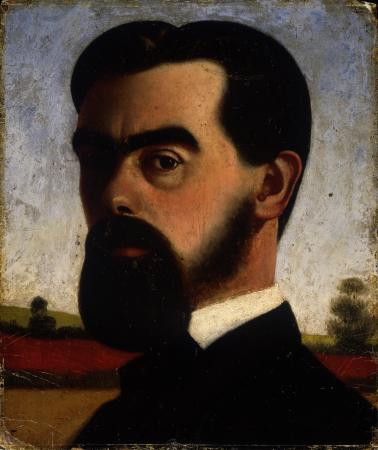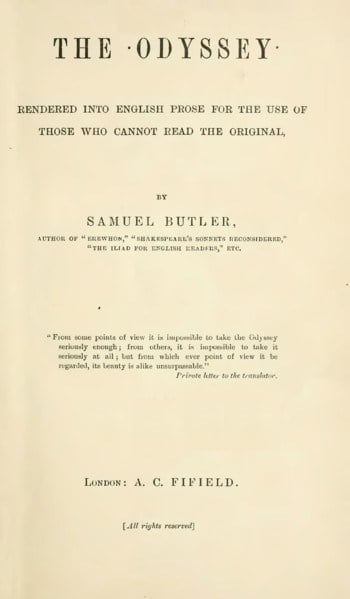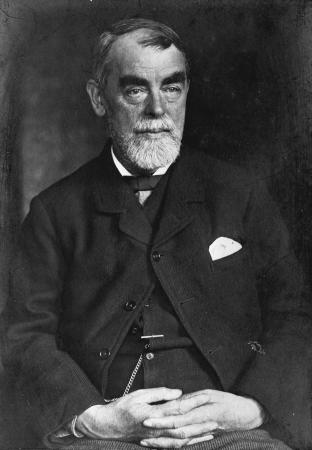Samuel Butler was an English novelist who is best known for his novels Erewhon and The Way of All Flesh. Although his novels were originally published anonymously, they were eventually released under his own name after his death. Butler also translated several ancient Greek poems.
Butler was a Cambridge University graduate who was initially going to be ordained into the Anglican clergy but decided to sail to New Zealand and become a sheep farmer. However, he also later wrote Darwin Among the Machines which brought up new topics for discussion under Darwin’s evolution theory.
Quick Facts
- Full Name
- Samuel Butler
- Birth
- December 4, 1835
- Death
- June 18, 1902
- Nationality
- New Zealand
- Place of Birth
- Langar, Nottinghamshire, England
- Fields of Expertise
- [“Literature”,”Publishing”]
- Institutions
- Shrewsbury School, St. John’s College, Cambridge
- Contributions
- Correspondence, “Darwin among the Machines”
Read on to discover more about the fascinating life of Samuel Butler.
Who Was Samuel Butler?

.
©[email protected], Public domain, via Wikimedia Commons – Original / License
Samuel Butler was a great English novelist and essayist who lived in New Zealand from 1859 until 1864. Samuel shared his experience in New Zealand on the first pages of his satirical utopian novel Erewhon, published in 1872. Later, Samuel wrote another book, The Way of All Flesh, between 1873 and 1884 that partly touched on his life. At first, Samuel’s novels were published anonymously due to their critics, but in 1903 they were printed posthumously and published under his name.
Samuel Butler made studies on Christian orthodoxy, mechanical life, and Italian art. He also translated the famous Greek poems Iliad and Odyssey making him an exceptional writer at the time.
Early Life
Samuel Butler was a descendant from a line of Yeomen, born on December 4, 1835. He was the son of Rev. Thomas Butler and grandson of Dr. Samuel Butler. His grandfather was a great scholar who was enrolled in Rugby and Cambridge at an early age. Dr. Samuel later became the headmaster of Shrewsbury School and Bishop of Lichfield, respectively. For the love of religion, Dr. Samuel also wanted his son Thomas to join the Church of England.
Although Samuel’s dream was to join the Navy, he was forced to obey his father’s wishes. It made Samuel feel oppressed at a place he should call home, which made him a victim to a critic in The Way of All Flesh, “to make up for having been a servile son, became a bullying father.”
Like his father, Samuel Butler never enjoyed the feeling of a loving family. His education began at home and included heavy punishment. Even though Samuel endured the suffering, he later expressed his emotions by stating his parents were “brutal and stupid by nature .”
Samuel’s writings described how he was angered by his father’s ill-treatment; he wrote, “never liked me, nor I him; from my earliest recollections I can call to mind no time when I did not fear him and dislike him. I have never passed a day without thinking of him times over as the man who was sure to be against me.” Since Samuel’s parents took absolute control, he was forced into the priesthood against his wish.
Butler was enrolled at Shrewsbury School at the age of twelve. Life was never better as he met a cruel headmaster, Benjamin Hall Kennedy. he later created “Dr. Skinner” in his book The Way of All Flesh to criticize his headmaster. In 1854, Samuel went to St John’s Classics and graduated first in Classics in 1858.
Career
Anglican Clergy
Samuel was to be ordained into the Anglican clergy after his graduation at Cambridge. Before his ordination, he was offered a small parish in London 1858-1859. While serving in his parish, Samuel realized that infant baptism didn’t significantly affect a person’s morals and behavior, making him criticize his religion. Though his father tried convincing him to hold his faith, he never changed his mind; instead, he left London in September 1859 and sailed to New Zealand.
Samuel became a sheep farmer in the Canterbury settlement and focused on a new life away from the priesthood. He wrote about his arrival and experience at Mesopotamia Station, which inspired him to write the famous novel Erewhon.
Samuel had access to Darwin’s Origin of Species (1859) script days after arriving in New Zealand. It was an outstanding achievement for him as he was interested in Darwin’s essays on biological development. His knowledge of evolution led him to write “Darwin among the Machines,” published by The Press in 1863 but signed Cellarius.
The letter was based on comparing human development and Mechanical life, which gave assumptions that machines will be more potent than humans. Samuel alleged, ” In the course of ages, we shall find ourselves the inferior race.” Despite being Darwin’s enthusiastic admirer, Samuel highly criticized his selfishness for not acknowledging his grandfather Erasmus Darwin’s contributions to evolution theory.
In 1864, Samuel Butler returned to England and settled permanently. Afterward, the Utopian novel Erewhon gained the country’s attention, and people wanted to know the author. In 1872, Butler revealed himself and became a public figure.
Canadian Steamship Company
Samuel Butler invested in a Canadian steamship company and the Canada Tanning Extract Company, where he was appointed nominal director. The business was very challenging because of the impostors. It forced Samuel to travel to Canada to fight fraud; unfortunately, the company collapsed, resulting in a big loss.
Samuel was under financial constraints since his business failed, reducing his capital to £2,000. Having parted ways with his family, he couldn’t ask for any support; luckily, he was entitled to his parent’s property after the death of his aunt (1880) and father (1886). This was a relief to Butler, as he could sell The land at Whitehall previously held by his family to resolve his financial problem.
What is Samuel Butler Known for?
Correspondence, “Darwin among the Machines”
The June 13, 1863, issue of The Press newspaper in Christchurch, New Zealand, published a correspondence titled “Darwin Among the Machines” (click for the PDF version). The author was signed Cellarius, a pseudonym of Samuel Butler (1835-1902).
The correspondence had unique content explaining the possibility that machines were a kind of mechanical life undergoing constant evolution. Eventually, machines might supplant humans as the dominant species in the world.
Samuel Butler pointed out:
“The views of machinery which we are thus feebly indicating will suggest the solution to one of the day’s most mysterious questions. We refer to the question: What sort of creature is likely to be man’s next successor in the supremacy of the earth. We have often heard this debate, but it appears humans themselves are creating their successors. We are daily adding to the beauty and delicacy of the machines’ physical organization.
We are giving them greater power and supplying by all sorts of ingenious contrivances that self-regulating, self-acting power will be what intellect has been to the human race. In the course of ages, we shall find ourselves inferior in power and moral quality of self-control. we shall look up to them as the acme of all that the best and wisest man can ever dare to aim at.”
The correspondence ends with a creepy appeal:
“Our opinion is that humans should declare war to the death against mechanical life. The well-wisher of his species should destroy every machine of every sort. Let there be no exceptions made, no quarter shown; let us at once go back to the ancient condition of the race.”
On July 29, 1865, Lucubratio Ebria, an article containing variations of the view in Darwin among the Machines, sent by Butler from England, appeared in The Press.
In 1872 Butler published the satirical novel Erewhon. The Erewhonian society Butler envisioned had long ago undergone a revolution that destroyed most mechanical inventions. The narrator of the story finds a book that details the reasons for this revolution, which he translates for the reader, also discussing the possibility of machines reproducing like living organisms: Samuel said:
But the machines which reproduce machinery do not reproduce machines after their kind. A thimble may be made by machinery, but it was not made by, neither will it ever make, a thimble. So, if we turn to nature, we shall find lots of analogies teaching us the reproductive system may be complete without the thing produced being of the same kind as what made it. Very few creatures reproduce after their kind; they reproduce something which has the potentiality of becoming what their parents were.
For instance, the butterfly lays an egg, which hatches to a caterpillar, then chrysalis, and finally a butterfly. Although I agree that the machines cannot have the germ of an actual reproductive system at present, have we not just seen that they have only recently obtained the germs of a mouth and stomach? I hope no stride will be made toward true reproduction in a mechanical life, which shall be as great as that of actual feeding?
Erewhonian society concluded:
“That the machines were ultimately destined to supplant man’s race and become instinct with vitality as different from, and superior to, that of animals, as an animal to vegetable life. So, they made a clean sweep of all machinery that had not been in use for more than two hundred and seventy-one years.”
Samuel Butler: Marriage and Personal Life
Marriage
Samuel Butler never married. Although he had a close relationship with Lucie Dumas, they were never engaged.
Tragedy
Samuel Butler died on June 18, 1902, in a nursing home. He was cremated at Woking Crematorium, and his ashes were buried at an undisclosed place.
Personal Life
Samuel Butler’s personal life has been a concern for most scholars who want to understand his sexuality.
It raised the curiosity of many academics led by Herbert Sussman, who concluded that the great novelist was homosexual. Sussman further stated that there was no evidence pointing at Butler’s genital contacts with other men his “temptations of overstepping in the line strained his close male relationships.”
Samuel’s first male friend was Charles Pauli, whom he met in New Zealand. They had a mutual attachment and even returned together to England in 1864. Butler showed his true friendship to Pauli by financing his costly education.
Another close male friend was Henry Festing Jones, whom Butler hired as his literary assistant and traveling companion. Although they lived separately, it’s reported they met daily, wrote projects, and attended concerts together.
Later, Samuel wrote the poem “In Memorial H.R.F.,” which supports homosexual behavior. Samuel feared being summoned by Oscar Wilde and ordered the publication to stop.
Samuel Butler’s Published Works and Books

©Samuel Butler (novelist), Public domain, via Wikimedia Commons – Original / License
Satirical Utopian Novel Erewhon
Also called Over the Range, the book was published in 1872, and its content was to ridicule Victorian society. The novel starts with a description of a fictional country, “Erewhon .” the book is compared to Gulliver’s Travels, written by Jonathan Swift.
The novel’s Utopia (imaginary society) illustrates the old-age British Empire. Butler’s target was to criticize Victorian society’s criminal punishment and religion.
The novel of Erewhon borrowed most of its ideas from the letters Butler wrote for The Press. Actually, three of the book’s chapters created one topic, “The Book of the Machines,” which describes human displacement by machine evolution.
The Way of All Flesh
Also called Ernest Pontifex, it is a semi-autobiographical novel written around 1873. The book was a critic of Victoria’s reign. At first, the book was published as a general reaction against the Victorian era.
The title was drawn from the books of 1 Kings 2:2 in the bible, “I am going the way of all flesh: take thou courage and shew thyself a man.” the book tells a story of the Pontifex family narrated by Overton.
The first chapter traces Ernest’s emergency and narrates the lousy relationship with his parents. Later, Ernest starts his journey as a clergy in the church of England. Early scholars believe that the book reflects Butler’s experience with his family from Ernest’s story.
The image featured at the top of this post is ©[email protected], Public domain, via Wikimedia Commons – License / Original
